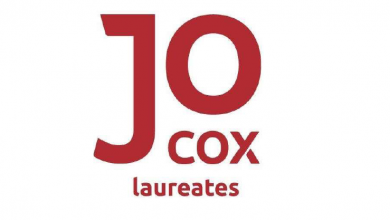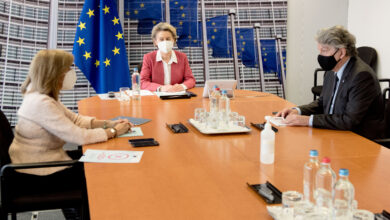Three Takeaways from the Latest Eurogroup Meeting

After three days of long negotiations, the Eurogroup has reached an agreement on the financial measures that will be made available to mitigate the catastrophic consequences of the COVID-19 crisis. The text of the agreement will be presented to the next meeting of the European Council on April 23rd. These safety nets take the form of loans from pre-existing funds or new financial schemes and add on the monetary programs already put in place by the European Central Bank (ECB).
Eurogroup finance ministers agreed on a 540 billion-euro package to be used at the European level as financial firepower; the text also foresees a future Recovery Fund that will be financed through “innovative instruments”. The European Investment Bank (EIB) will guarantee loans of 200 billion euros with a focus on small and medium-sized enterprises. The funds to draw from the European Stability Mechanism (ESM) amount to a maximum of 2% of each Member State’s GDP, meaning that 240 billion in total could be employed. The Eurogroup also welcomed the Commission’s proposal for a “Support to mitigate Unemployment Risks in an Emergency” (SURE), a loaning scheme providing up to 100 billion euros to help rescue workers and their jobs.
During the negotiations, the Netherlands did not buckle over Eurobonds, an instrument that according to the Dutch finance minister Hoekstra “will not help Europe in the long term”. The Netherlands, however, had to concede over the conditions of the ESM fund: loans targeted to cover healthcare-related costs will come with no strings attached, while conditions would be applied to revive the economy. Eurobonds (dubbed coronabonds amid the current crisis) were originally advanced by Italy, Spain and France and six other Member States in a letter sent to the President of the European Council Charles Michel.

Many citizens welcomed the agreement negatively. In Italy, calls for Italexit are mounting while some European citizens display concerns over the real use of the allocated funds by the most indebted countries. To clarify the most salient points, here are three key takeaways from the Eurogroup’s negotiation:
1 – This outcome was to be expected: Eurobonds are a sensitive issue
The issuing of Eurobonds could take different shapes and modalities. However, a core pillar of the concept is that these new financial obligations would be jointly guaranteed by the Eurozone countries and issued by a supranational or intergovernmental institution. Being guaranteed by fiscally sound countries as well, these new obligations would decrease the borrowing costs for governments, primarily benefiting highly indebted countries.
The Commission already proposed several forms of Eurobonds in the past, but it was met with timid responses from countries such as Germany, the Netherlands and Finland. While it is not clear what effect Eurobonds would have on the existing debt, some economists argue that borrowing costs would converge, meaning that countries like Germany would lose out of the initiative. Moral hazard and free riding constitute another concern. Northern countries and fiscal conservatives fear that inefficient governments could take advantage of these bonds to overspend and avoid fixing structural problems afflicting their economic systems.
The mutualization of debt is a sensitive issue to many, and Italian citizens should think twice before painting themselves as outraged victims of the EU. Southern countries generally suffer from rampant corruption, waste of public money and high rates of tax evasion. Proving to the rest of the European family that they are committed to fixing these problems would be an excellent step in the right direction.
Furthermore, from a strictly economic point of view, the refusal to set up Eurobonds is not as tragic as it seems. The European Central Bank is already supporting the hardest-hit countries with its Pandemic Emergency Purchase Programme (PEPP), which led to a fall in borrowing costs for Italy and therefore more financial levy to support its economy. The ECB also decided to accept junk-rated Greek government bonds to support the country during this emergency.
2 – Prejudices and irresponsible media are weakening our Union
The new coronavirus is a symmetric shock with asymmetric consequences which Spain and Italy did not bring onto themselves. The Dutch Minister Hoekstra was forced to apologize after his inexcusable remarks about Southern Eurogroup countries’ ability to face the looming economic crisis. In dire times of great suffering, such declarations from government officials, even if legitimate, feed mutual distrust between citizens of different Member States.

Many in the North of Europe see Italy as a bottomless pit which thrives out of European funds, forgetting the country’s role as founder and third net contributor of the EU budget and thus its fundamental role in the very financial sustainability of the EU. While problems are certainly present, stereotypes should never dominate public debates, especially in such delicate times.
The media have a great responsibility in conveying information from Bruxelles to European citizens. The weak public relations skills of the EU together with the language differences within the bloc, make national media the main harbingers of information to each country’s public opinion. The current international support to Italy is a topical case example: while the EU and its Member States have factually given and promised to Italy more support to face the epidemic than any other foreign power, many Italians still believe that China and Russia did more than the EU or that the EU did not support Italy at all.
Some might argue that this is the price to pay for the shameful refusal of Germany and France to send face masks to Italy at the onset of the emergency. However, few Italians know that the masks eventually reached the country thanks to the intervention of the European Commission. The media did not communicate such news as strongly and convincingly as they did with the negative news. Actually, they did not communicate it at all.
3 – A European Federation is still urgently needed
The federal government of the United States can adopt fiscal transfers to help poorer states recover from asymmetric economic shocks – rich states like New York or California sustain the finances of Arkansas and Mississippi in unfortunate times. After Germany’s unification, the federal government of Germany imposed a solidarity tax on the country’s rich western regions to foster the growth of its eastern territories, once controlled by the German Democratic Republic. Such measures are obviously unpopular within the richest regions, but it is difficult to find independent countries where some form of fiscal transfer from industrialized to poor regions is not in place. This also indirectly benefits richer regions, which find new customers and reinvigorated markets for their products and services.
European Member States are surviving in a multipolar world order where competing with emerging superpowers like China has become extremely difficult, also in military terms. The European Union represents the ideal platform to confront these powers as a unified bloc. However, the uncompleted integration process is revealing all its costly shortcomings. The EU can hardly be considered an independent foreign policy actor and its budget is completely inappropriate to face issues such as climate change and even pandemics in a coherent way. Yes, countries are also responding individually with their own resources, but this approach could also end up exacerbating existing disparities.

If some Member States are left with insufficient financial help, they could turn to China in search of more favourable credit lines. The signature of Memorandums of Understanding over the Chinese Belt and Road Initiative gives us a glimpse of what a more fragmented and less cohesive Europe could entail. China is known to use debt-trap diplomacy: this would risk leaving to the Asian power the control of key European assets and infrastructures.
While maybe politically unfeasible right now, the set up of Eurobonds must still be pursued to finally pave the way for a fiscal union and eventually a political union. When Eurogroup Member States realized that a Greek default would cause a grave rupture in the entire Eurozone, they set up the European Stability Mechanism because EU treaties did not allow direct fiscal transfers to the needy regions of the Union. It is time to rethink that mechanism. Leaders should, however, take into account democratic accountability in the process, in the hope that European citizens will come to realize that in unity lies strength.






I do believe European richest countries stumbling towards a European Federation is opening doors to a chinese finantial dependency from europeans countries in need.
Northern countries are wellcoming chinese presence at their borders… Today economic, soon… military…